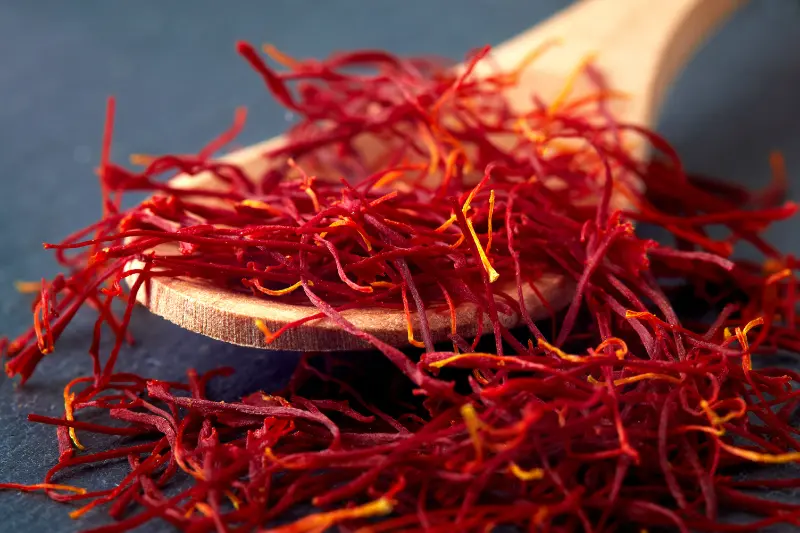How healthy is saffron?
Saffron has been used in Asia for thousands of years as a healing or health-promoting plant. Nutrition expert Beth Czerwony from the Cleveland Clinic in the USA explains how saffron affects health and how to use the spice properly. Ref.
Health benefits from saffron
According to the expert in a recent press release, there is a lot of research that suggests saffron can promote health or help with certain health problems. But what exactly are the beneficial effects of saffron?
9 Benefits of Saffron
We’re going to show you the nine benefits of saffron for your health, but first, let’s talk a little about this ancient spice. Saffron has long been a culinary spice, used as a seasoning (coloring and aromatic) to give dishes a yellowish color and as a natural remedy for important ailments, such as strengthening the digestive system.
By using saffron as a spice in dishes, we reap many of its benefits. Its bitter compounds increase salivary and gastric secretion, and it is an excellent eupeptic agent. It also helps maintain good digestion and prevent constipation problems.
The main ingredient in this spice is crocetin, a natural antioxidant that can scavenge free radicals and cause cellular aging. It can improve overall health, and you can benefit from this property without consuming too much. Ref.
So, here are 9 health benefits of saffron:
No 1.It is a powerful antioxidant.
Saffron contains a variety of impressive phytochemicals that act as antioxidants, protecting molecules from free radicals and oxidative stress molecules.
No 2. May improve mood and treat symptoms of depression.
Saffron supplements considerably outperformed placebos in treating mild to moderate depression symptoms, according to a study of five research.
No 3. It has anti-cancer properties.
Antioxidants found in abundance in saffron aid in scavenging dangerous free radicals. Free radical damage is associated with chronic diseases such as cancer.
No 4. May reduce symptoms of premenstrual syndrome.
In women aged 20 to 45, taking 30 mg of saffron per day is more effective than a placebo in treating PMS symptoms such as irritability, headaches, cravings, and pain.
No 5. It reduces appetite and helps lose weight.
Saffron helps prevent snacking by curbing appetites. In an eight-week study, women taking saffron supplements felt significantly fuller, ate less often, and lost more weight than the control (placebo) group.
No 6. Reduces risk factors for heart disease.
Several studies indicate that saffron’s antioxidant properties may lower blood cholesterol levels and prevent clogging of blood vessels and arteries.
No 7. lowers blood sugar levels
Saffron can lower blood sugar levels and increase insulin sensitivity, as observed in test tube studies and in mice with diabetes.
No 8. Improves vision in adults with age-related macular degeneration (AMD).
Saffron appears to improve vision in adults with AMD. It also protects against free radical damage associated with AMD.
No 9. Improves memory in adults with Alzheimer’s disease.
The antioxidant properties of saffron may improve cognition in adults with Alzheimer’s disease.
NOTE:
Saffron is easy to incorporate into your diet. It usually comes in the form of powder or fine threads. To use saffron threads, grind them first and then soak them in hot liquid for about 15 minutes before adding them to the board. Or add them during cooking. Antioxidants found in abundance in saffron aid in scavenging dangerous free radicals.
Saffron turns dishes brown, like paella. You can also use saffron in soups, seafood, poultry, pasta, rice dishes, and even baked goods like bread, muffins, and cookies. Ref.
